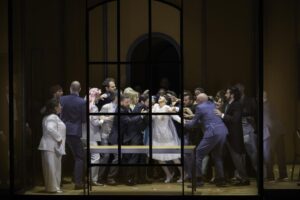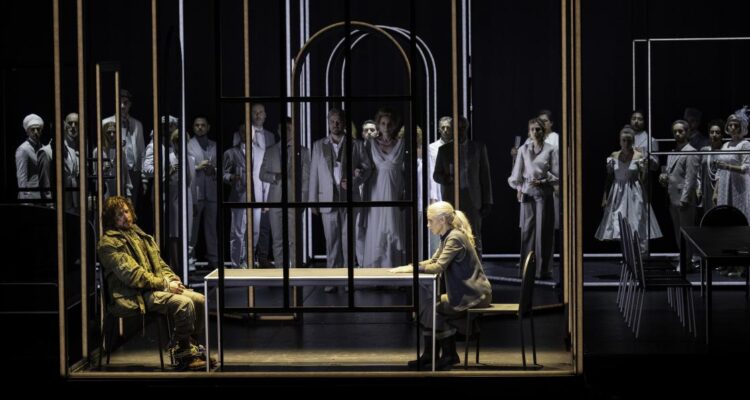Christoph Willibald Gluck’s operas, “Iphigénie en Aulide” and “Iphigénie en Tauride,” composed six years apart, offer contrasting perspectives on the mythological figure of Iphigenia. “Iphigénie en Aulide” focuses on the prelude to the Trojan War, blending French and Italian operatic elements within a more formal and traditional structure. In contrast, “Iphigénie en Tauride” deals with the aftermath of the Trojan War, emphasizing the distress and traumas of its main characters with continuous and integrated musical and dramatic elements.
At the Festival d’Aix-en-Provence, these two operas are presented in one evening, creating the impression of a single, cohesive narrative. This ambitious project is made possible by the combined efforts of the Concert d’Astrée orchestra, conducted by the exceptional Emmanuelle Haïm, and the visionary direction of Dmitri Tcherniakov.
Tcherniakov’s production shifts the focus to the horrors of war and its damaging consequences, drawing explicit parallels to the ongoing conflict in Ukraine by incorporating detailed imagery of the casualties. Tcherniakov unifies the two operas visually by using the same stage concept for both settings and dramatically by allowing ghosts and memories from “Iphigénie en Aulide” to reappear in “Iphigénie en Tauride.”
In “Iphigénie en Aulide,” we don’t see gods and heroes of Greek tragedies but through windows, doors, and canvas walls of the staging we delve into the lives of the Atreid family cynically deciding Iphigenia’s fate and the war’s course with a mix of recklessness and folly. Only Iphigenia stands apart from the collective madness, accepting her sacrifice more with resignation than a sense of duty, perhaps foreseeing the subsequent horror.
In “Iphigénie en Tauride,” the war has left only destruction, and all characters grapple with the consequences of their actions and ghosts from the past. Oreste is tormented by his matricide, Iphigenia by the loss of her family. In this dehumanized and desolate world, the strong bond between Oreste and Pylades offers a glimpse of humanity. Iphigenia, once a victim, is now an executioner, and even her reconciliation with her brother Oreste provides no hope. Unlike in Gluck’s original finale, she chooses to stay in Tauris. However, towards the end, the direction loses momentum, and the scene between Oreste and Pylades becomes tiresome, especially since they perform with tied hands and feet. The finale also feels understated.

The double cast of the evening is formidable. In “Iphigénie en Aulide,” Russell Braun portrays Agamemnon as a conflicted man not in charge of his own destiny, while Véronique Gens is a glamorous Clytemnestre, a concerned mother but frivolous and slightly hysterical. Her impressive stage presence continues into the second opera, where she appears as a ghost. Alasdair Kent’s light tenor voice suits the spoiled and narcissistic character of Achilles, aligning with the director’s vision. In “Iphigénie en Tauride,” Florian Sempey as Oreste is the most poignant singer, his torment for the matricide nearly leading to self-destruction, but he is redeemed by his loyalty to Pylades, sung by Stanislas de Barbeyrac, who steals the scene several times. Alexandre Duhamel aptly performs a Thoas affected by PTSD. The real star of the evening is Corinne Winters as Iphigenia, performing in both operas for almost five hours. She skillfully captures the character’s evolution from a capricious brat to a dutiful daughter, and finally, to a disillusioned woman. Her legato singing and voice control are mesmerizing and even though her portrayal may at times lack dramatic pathos, she brings a melancholic quality to Iphigenia that balances the excesses of the other characters.
The strenuous work of Emmanuelle Haïm and the orchestra deserves special mention. For nearly five hours, she maintains a fast pace without any loss of focus, masterfully highlighting every color of the score.
This musical experiment offers intriguing points of reflection, and despite appearing contrived at times, it is, in my opinion, worth seeing it.
By Christoph Willibald Gluck
Libretto: François-Louis Gand Le Bland Du Roullet – Nicolas-François Guillard
Conductor: Emmanuelle Haïm
Director: Dmitri Tcherniakov
Cast includes: Corinne Winters, Russell Braun, Véronique Gens, Alasdair Kent, Florian Sempey, Stanislas de Barbeyrac, Alexandre Duhamel
Orchestra and choir: Le Concert d’Astrée
Photo credit: Monika Rittershaus
Until the 23st of July 2024

